Films from the country "japon", sorted by rating

The Life of Oharu (1952)
, 2h28Directed by Kenji Mizoguchi
Origin Japon
Genres Drama
Themes Seafaring films, Films about sexuality, Sports films, Transport films, Erotic films, Films about prostitution, Martial arts films, Erotic thriller films
Actors Kinuyo Tanaka, Ichirō Sugai (菅井一郎), Toshiro Mifune, Takashi Shimura, Chieko Higashiyama, Jūkichi Uno
The story opens on Oharu as an old woman in a temple flashing back through the events of her life. It begins with her love affair with a page, Katsunosuke (Toshirō Mifune), the result of which (due to their class difference) is his execution and her family's banishment. Oharu attempts suicide but fails and is sold to be the mistress of Lord Matsudaira with the hope she will bear him a son. She does, but then is sent home with minimal compensation to the dismay of her father, who has worked up quite a debt in the meantime. He sends her to be a courtesan, but there, too, she fails and is again sent home. She goes to serve the family of a woman who must hide the fact that she is bald from her husband. The woman becomes jealous of Oharu and makes her chop off her hair, but Oharu retaliates, revealing the woman's secret. She again must leave—this time she marries a fan maker who is killed shortly after during a robbery. She attempts to become a nun, but Oharu is thrown out after being caught naked with a man seeking reimbursement for an unauthorized gift (it is made clear this is rape by Oharu's claims and distraught demeanor). She is thrown out of the temple, becomes a prostitute, but fails even at that. In the end, she is recalled to the Lord's house in order to keep secret her activities and to be exiled within the compounds to keep her secrets locked away. While being scolded for the life she chose, she attempts to find her son, and in the process, ends up running away as she chooses the life of a beggar over the life in exile.

Tokyo Twilight (1957)
, 2h20Directed by Yasujirō Ozu
Origin Japon
Genres Drama
Themes Films about families, Pregnancy films, Seafaring films, Transport films
Actors Kamatari Fujiwara, Ineko Arima, Setsuko Hara, Isuzu Yamada, Chishū Ryū, Haruko Sugimura
Akiko Sugiyama (Ineko Arima) is a young college graduate girl learning English shorthand. Her elder sister Takako (Setsuko Hara), running away from an unhappy marriage, has returned home to stay with Akiko and their father Shukichi (Chishū Ryū) in Tokyo, together with her toddler girl. Shukichi works in a bank in Tokyo. Akiko has a relationship with her college boyfriend Kenji, which results in an unwanted pregnancy. Later, Akiko has an abortion after an encounter in which she realizes that her boyfriend does not love her.

Perfect Blue (1998)
, 1h20Directed by Satoshi Kon
Origin Japon
Genres Thriller, Animation
Actors Junko Iwao, Rica Matsumoto, Yōsuke Akimoto, Masaaki Ōkura, Yoku Shioya, Hideyuki Hori
Mima Kirigoe, the lead singer of the fictional J-pop idol group "CHAM!", decides to leave the group to become an actress, believing that the idol group life is a dead end job. Her first project is a crime drama series, Double Bind. Some of her fans are upset by her change in career, including a stalker known as "Me-Mania". Shortly after leaving CHAM!, Mima receives an anonymous fax calling her a traitor. She also finds a website called "Mima's Room", which features public diary entries that seem to be written by her that discuss her life in great detail. She brings the site to the attention of her manager, ex-pop star Rumi Hidaka, but is advised to ignore it.
 , 1h29
, 1h29Origin Japon
Genres Comedy, Fantasy, Animation
Actors Rie Kugimiya, Ryōka Yuzuki, Yuko Gibu, Junko Takeuchi, Daisuke Sakaguchi
À l'école des Tamagotchis, les enfants Tamagotchis attendent l'arrivée de la bibliothèque volante. Tout en parlant du genre de livres qu'ils aimeraient lire, un autre jeune étudiant ajoute un commentaire grossier au rêve du Mametchi. Chamametchi le reconnaît comme Kikitchi, une nouvelle élève de sa classe. Mametchi explique alors à Kikitchi que la bibliothèque volante est un vaisseau volant qui contient des livres magiques que les enfants transportent magiquement et fait le personnage principal quand ils les lisent. Juste à ce moment, l'ouïe sensible de Kikitchi capte le son de la corne du vaisseau. Bien que personne d'autre ne puisse l'entendre, le vaisseau apparaît au bout d'une minute. Les frères et sœurs Otogitchi, qui s'occupent de la bibliothèque, descendent le navire et descendent un escalier que les enfants Tamagotchis escaladent avec empressement.
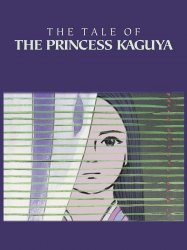 , 2h17
, 2h17Directed by Isao Takahata
Origin Japon
Genres Drama, Fantastic, Fantasy, Historical, Animation
Themes Space adventure films, Feminist films, Seafaring films, Transport films, Sur la Lune, Political films, Alternate history films, Space opera, Children's films
Actors Kengo Kora, Takeo Chii, Nobuko Miyamoto, Atsuko Takahata, Tomoko Tabata, Darren Criss
A bamboo cutter named Sanuki no Miyatsuko discovers a miniature girl inside a glowing bamboo shoot. Believing her to be a divine presence, Miyatsuko and his wife decide to raise her as their own, calling her "Princess". The girl grows rapidly and conspicuously, marveling her parents and earning her the nickname "Takenoko" (Little Bamboo) from the other children in the village. Sutemaru, the oldest among Kaguya's friends, develops a particularly close relationship with her.
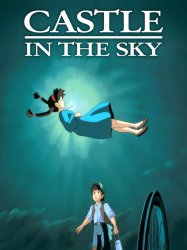
Castle in the Sky (1986)
, 2h6Directed by Hayao Miyazaki
Origin Japon
Genres Drama, Science fiction, Fantasy, Action, Adventure, Animation, Romance
Themes Environmental films, Feminist films, Transport films, Aviation films, Political films, Cyberpunk films, Steampunk films, Children's films, Robot films, Mise en scène d'une plante
Actors Keiko Yokozawa, Mayumi Tanaka, Minori Terada, Ichirō Nagai, Olivier Martret, Manon Azem
In the film's backstory, human civilizations built flying cities, which were later destroyed by an unspecified catastrophe, forcing the survivors to live on the ground. The only remaining flying city, Laputa, still floats in the sky, concealed by a permanent powerful thunderstorm that surrounds it.
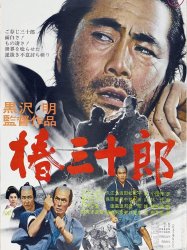
Sanjuro (1962)
, 1h36Directed by Akira Kurosawa
Origin Japon
Genres Drama, Comedy, Action
Themes Seafaring films, Sports films, Transport films, Martial arts films, Samurai films
Actors Toshiro Mifune, Tatsuya Nakadai, Keiju Kobayashi, Reiko Dan, Yūzō Kayama, Takashi Shimura
Nine young samurai, including his nephew, believe that the lord chamberlain, Mutsuta, is corrupt after he tore up their petition against organised crime and said maybe he himself was behind the crimes. One of them tells the superintendent of this and he agrees to intervene. As the nine meet secretly at a shrine and discuss their problem, a ronin (Mifune) emerges from another room where he has been resting. The ronin has overheard their plans, and suggests that the superintendent is in fact the real corrupt official. While at first the samurai are insulted by his claims, they soon find themselves surrounded by the superintendent's men, proving that he was correct. The ronin hits a few of the attackers and bluffs their leader into leaving, taking only a small amount of money in reward to buy food because he is starving; however, after realizing that Mutsuta and his family must now be in danger, he decides to help the samurai bring down the corrupt officials.

Nobody Knows (2004)
, 2h21Directed by Hirokazu Kore-eda
Origin Japon
Genres Drama
Themes Films about children, Seafaring films, Transport films, L'enfance marginalisée
Actors Yūya Yagira, You, Ryō Kase, Kenichi Endō, Susumu Terajima
Nobody Knows tells the story of four siblings and their young mother who move into a small apartment in Tokyo. The film begins when the family is moving into a small rented apartment. Only the eldest, Akira is known to the landlord, while Shigeru and Yuki hide in separate luggage. The elder sister, Kyōko, comes separately by train. All the children have different fathers. They are not allowed to go to school or to be seen by others, and only Akira is allowed to go outside. Yet, the family seems to be happy.
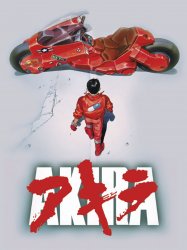
Akira (1988)
, 2h4Directed by Takashi Nakamura, Katsuhiro Ōtomo
Origin Japon
Genres Science fiction, Action, Animation
Themes Films about computing, Seafaring films, Post-apocalyptic films, Films about religion, Transport films, Motocyclette, Films set in the future, Political films, Road movies, Cyberpunk films, Dystopian films, Disaster films
Actors Mitsuo Iwata, Nozomu Sasaki, Mami Koyama, Tesshō Genda, Tarō Ishida, Hiroshi Ōtake
On 16 July 1988, an orb of light destroys Tokyo and World War III begins. Thirty-one years later, in the city of Neo-Tokyo, Shotaro Kaneda has his bōsōzoku gang, the Capsules, battle their rival gang, the Clowns. While there, Kaneda's best friend, Tetsuo Shima, crashes his motorcycle into Takashi, an esper with psychic powers, who had fled from a secret government laboratory with help from a covert operative. Colonel Shikishima, assisted by another esper called Maseru, has Takashi escorted back to his original lodgings and Tetsuo is abducted. When Kaneda and his gang are interrogated, he encounters Kei, a member of the revolutionary group, and arranges her release along with the Capsules.
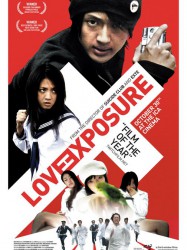
Love Exposure (2009)
, 3h57Directed by Sion Sono
Origin Japon
Genres Drama, Thriller, Comedy, Comedy-drama, Romantic comedy, Action, Romance
Themes Seafaring films, Films about sexuality, Films about suicide, Transport films, LGBT-related films, Transgender in film, LGBT-related films, LGBT-related film, Lesbian-related films, Cross-dressing in film
Actors Takahiro Nishijima, Hikari Mitsushima, Sakura Andō, Itsuji Itao, Makiko Watanabe, Rika Kawamura
The story follows Yū Honda (Takahiro Nishijima), a young teenage Catholic attempting to live his life in a faithful and orderly manner. His father, Tetsu, has become a devout Catholic priest following the death of Yū's mother, and operates his own church. Yū's father asks Yū to confess his sins, but Yū believes he is a good person, who has little to confess. At first he makes up sins, but his father sees right through him, and Yū sets out to commit real sins. Because of this, he falls in with a questionable crowd.
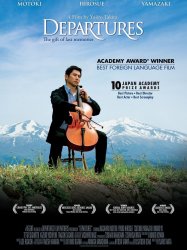
Departures (2008)
, 2h11Directed by Yōjirō Takita
Origin Japon
Genres Drama, Musical theatre, Musical
Themes Seafaring films, Films about music and musicians, Transport films, Musical films
Actors Masahiro Motoki, Ryōko Hirosue, Tsutomu Yamazaki, Kimiko Yo, Kazuko Yoshiyuki, Tōru Minegishi
Daigo Kobayashi (Masahiro Motoki) loses his job as a cellist when his orchestra is disbanded. He and his wife Mika (Ryōko Hirosue) move from Tokyo to his hometown in Yamagata, where they live in his childhood home that was left to him when his mother died two years earlier. It is fronted by a coffee shop that Daigo's father had operated before he ran off with a waitress when Daigo was six; since then the two have had no contact. Daigo feels hatred towards his father and guilt for not taking better care of his mother. He still keeps a "letter-stone"—a stone which is said to convey meaning through its texture—which his father had given him many years before.

The Naked Island (1960)
, 1h34Directed by Kaneto Shindō
Origin Japon
Genres Drama
Themes Seafaring films, Transport films, Films about the labor movement
Actors Nobuko Otowa, Taiji Tonoyama
The film depicts a small family, a husband and wife and two sons, struggling to get by on a tiny island in the Seto Inland Sea, over the course of a year. They are the island's only occupants, and survive by farming. They must repeatedly carry the water for their plants and themselves in a row boat from a neighboring island.

The Burmese Harp (1956)
, 1h56Directed by Kon Ichikawa
Origin Japon
Genres Drama, War, Musical
Themes Seafaring films, Transport films, Political films
Actors Rentarō Mikuni, Jun Hamamura, Shōji Yasui, Taketoshi Naito, Kō Nishimura, Yūnosuke Itō
Private Mizushima (Shôji Yasui), a Japanese soldier, becomes the harp (or saung) player of Captain Inouye's (Rentarō Mikuni) group, composed of soldiers who fight and sing to raise morale in the World War II Burma Campaign. When they are offered shelter in a village, they eventually realize they are being watched by British soldiers. They retrieve their ammunition, then see the advancing force. Captain Inouye tells the men to sing, laugh and clap, to give the British the impression that they are unaware of their presence. Instead of firing at them, though, the British soldiers begin singing the same melody. They learn that the war has ended with the Japanese surrender, and so they surrender to the British.

The Bad Sleep Well (1960)
, 2h31Directed by Akira Kurosawa
Origin Japon
Genres Drama, Thriller, Noir, Crime
Themes Films about families, Seafaring films, Théâtre, Transport films, Political films, Films based on plays, Films based on works by William Shakespeare, Films about royalty
Actors Toshiro Mifune, Masayuki Mori, Kyōko Kagawa, Takashi Shimura, Tatsuya Mihashi, Chishū Ryū
The film begins with a group of news reporters watching, and gossiping, at an elaborate wedding reception for Yoshiko Iwabuchi (Kyoko Kagawa), the daughter of Vice President Iwabuchi (Masayuki Mori, the villain character) of the Unexploited Land Development Corporation, a construction company, and Koichi Nishi, the president's secretary (a bespectacled Toshiro Mifune). The police interrupt the wedding when corporate assistant officer Wada, who is the wedding reception's master of ceremony, is arrested on charges of bribery in a kickback scheme. The reporters comment this incident is similar to an earlier scandal involving Iwabuchi, administrative officer Moriyama, and contract officer Shirai. That earlier case was hushed up after the apparent suicide of Assistant Chief Furuya, by jumping off the corporate office building, creating a dead end in the investigation before any of the company's higher-ups could be implicated.

An Autumn Afternoon (1962)
, 1h53Directed by Yasujirō Ozu
Origin Japon
Genres Drama
Themes Films about alcoholism, Medical-themed films, Films about drugs
Actors Chishū Ryū, Shima Iwashita, Mariko Okada, Keiji Sada, Nobuo Nakamura, Kuniko Miyake
Shūhei Hirayama (Chishū Ryū) is an ageing widower with a 32-year-old married son, Kōichi (Keiji Sada), and two unmarried children: 24-year-old daughter Michiko (Shima Iwashita) and a 21-year-old son Kazuo (Shin'ichirō Mikami). The ages of the children, and what they respectively remember about their mother, suggest that she died just before the end of the war, perhaps in the bombing of Tokyo in 1944-45. Since his marriage, Kōichi has moved out to live with his wife in a small flat, leaving Hirayama and Kazuo to be looked after by Michiko.
 Connection
Connection